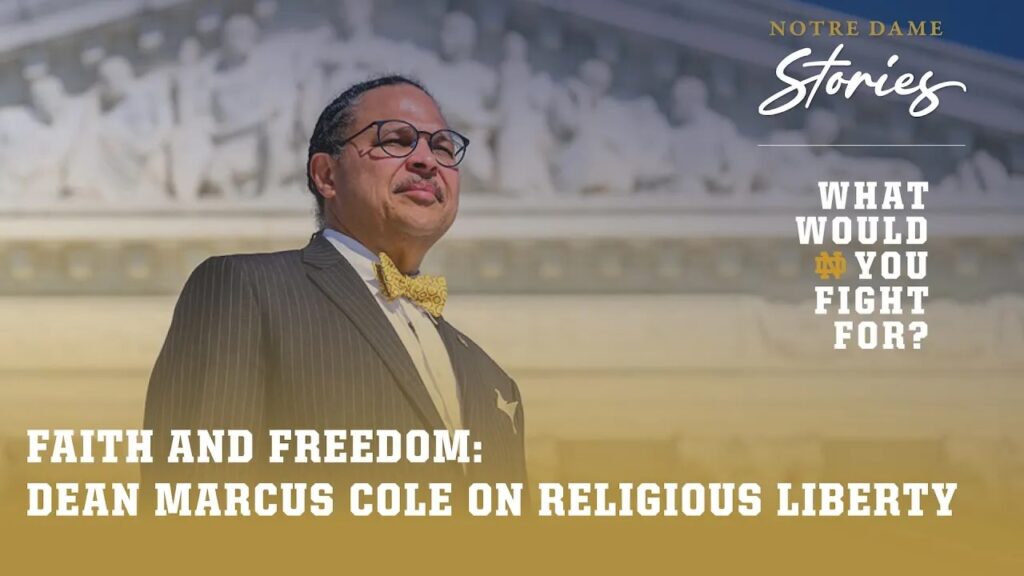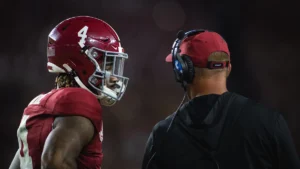
According to Dean Marcus Cole and the Notre Dame Law School, preserving religious freedom is crucial to defending all human rights, particularly for land-based and minority faiths:
At the heart of the University of Notre Dame’s commitment to human dignity and justice stands a deeply held conviction: religious freedom is not just one right among many—it is the cornerstone of all human rights. Dean G. Marcus Cole of Notre Dame Law School has become one of the leading academic voices in asserting that the protection of religious liberty, especially for land-based and minority faiths, is essential to upholding the broader framework of human rights worldwide.
Dean Cole, a legal scholar of high renown and the first Black dean in the Law School’s history, believes that religious freedom functions as a litmus test for a society’s moral and legal integrity. In recent speeches, articles, and Notre Dame-led initiatives, he has made the case that when governments protect religious conscience—particularly for vulnerable groups—they also affirm a people’s right to identity, tradition, and expression.
“Religious freedom,” Cole stated in a keynote at a global summit on human rights, “is the first freedom. It’s the right upon which all other rights depend.”
Notre Dame Law School, founded in 1869, has long considered itself a moral compass within American legal education. Rooted in Catholic social teaching, the school sees law not only as a system of governance but as a vehicle for justice, conscience, and human flourishing. This outlook has placed religious freedom at the center of its institutional mission, a commitment that has only deepened under Dean Cole’s leadership.
Cole, who assumed the deanship in 2019, brought with him a vision of legal scholarship that reaches across disciplines and borders. His leadership has transformed Notre Dame into a hub for international religious liberty advocacy, from defending indigenous land rituals in the Americas to supporting Coptic Christians in the Middle East.
The Religious Liberty Initiative, launched in 2020 under Cole’s guidance, has filed amicus briefs before the U.S. Supreme Court, supported legal petitions at the European Court of Human Rights, and partnered with minority communities to protect sacred practices and lands.
While much of the discourse around religious freedom in the West centers on individual conscience or public accommodations, Dean Cole insists that land-based and minority faiths are often the canary in the coal mine. When their rights are ignored or trampled, it signals deeper, systemic failures in human rights protection.
“Faiths that are tied to the land—whether Native American traditions, Australian Aboriginal spiritualities, or African indigenous religions—are uniquely vulnerable,” Cole has explained. “They cannot relocate their sacred practices to new temples or buildings. Their liturgy is in the soil, in the rivers, in the sky.”
This spiritual geography creates legal complexities. In countries like the United States, where property law often dominates religious liberty cases, sacred spaces without clear deeds or boundaries are frequently excluded from legal protection. In response, Notre Dame Law School has helped develop legal frameworks that reimagine sacred land not just as real estate, but as a vessel of culture, history, and divine connection.
In 2023, the Religious Liberty Initiative supported a coalition of Native American tribes in Apache Stronghold v. United States, a case involving the Oak Flat area in Arizona—land sacred to the San Carlos Apache Tribe, threatened by a mining project. Notre Dame’s legal scholars argued that denying protection to the area constituted a direct violation of the Religious Freedom Restoration Act (RFRA) and broader international human rights standards.
Although the court ruled against the Apache plaintiffs, Dean Cole called the ruling “a stark reminder of how vulnerable minority faiths remain—even in the most religiously diverse democracies.”
Beyond land-based traditions, Notre Dame Law School has also turned its attention to the plight of persecuted religious minorities globally. From Uyghur Muslims in China to Yazidis in Iraq, the school’s scholars and students work alongside international partners to defend religious expression as an inviolable human right.
Cole has often pointed out that minority faiths—especially when politically inconvenient—are among the first groups to be silenced, surveilled, or marginalized by authoritarian regimes. “You can measure a society’s health by how it treats its religious minorities,” he said during a 2024 Notre Dame conference on genocide prevention. “The moment faith becomes dangerous to the state is the moment the state becomes dangerous to its people.”
In support of this global mission, the Law School has expanded its Global Religious Liberty Practicum, allowing students to collaborate with human rights lawyers on cases involving blasphemy laws, forced conversions, and religious imprisonment. Recent projects include drafting legal arguments against apostasy charges in Sudan and aiding Christian converts facing deportation from Western countries.
Dean Cole’s philosophy is rooted in more than legal precedent—it’s also deeply personal. As a practicing Catholic and the descendant of enslaved African Americans, Cole often draws parallels between the denial of religious freedom and historical oppression. For him, faith is not only a right but a means of survival and hope in the face of injustice.
“My ancestors were stripped of language, culture, and kin—but they clung to faith,” he said during a 2023 convocation address. “And in that faith, they found their humanity. That’s why I fight for religious liberty—not just as a legal scholar, but as someone who understands what it means to have everything else taken away.”
This deeply humanist view of law has helped shape a new generation of legal minds at Notre Dame. Students are encouraged to see themselves not merely as future attorneys, but as defenders of a moral order rooted in dignity, conscience, and the divine.
Some critics argue that a Catholic law school championing religious liberty might have blind spots—particularly in pluralistic societies. But Dean Cole insists that Notre Dame’s Catholic identity enhances, rather than limits, its commitment to universal rights.
“The Church has long taught that conscience must never be coerced,” Cole notes. “Our advocacy is not for Catholics alone. It’s for Muslims, Jews, Sikhs, Hindus, agnostics—anyone whose sincere beliefs deserve protection under the law.”
Indeed, the school’s legal work reflects this ecumenical approach. Its briefs and publications have defended Muslims’ right to wear hijabs, Jews’ right to ritual slaughter, and Sikhs’ right to carry ceremonial daggers. Cole argues that by standing with the most marginalized, the Catholic legal tradition can live out its highest ideals.
Notre Dame’s emphasis on religious freedom isn’t limited to courtrooms. Under Dean Cole’s leadership, the school has also become a policy influencer in Washington, D.C., Brussels, and the United Nations. Faculty members routinely testify before legislative committees, advise diplomats on religious minority rights, and consult with intergovernmental organizations on best practices for legal pluralism.
In 2024, the Religious Liberty Initiative helped draft language for a U.S. Senate bill designed to prevent federal agencies from funding projects that harm indigenous sacred sites. The bill drew bipartisan support, with lawmakers citing Notre Dame’s legal analysis in their floor speeches.
Perhaps what sets Notre Dame’s approach apart is its focus on community engagement. Law students are required to take courses that include real-world immersion—visiting reservations, urban religious centers, or refugee communities to better understand how faith functions in daily life.
These experiences are more than educational. They serve as reminders that the stakes of religious freedom are not abstract. For the San Carlos Apache, the destruction of Oak Flat would sever a sacred tie that predates the Constitution. For Uyghur families, praying in secret can mean risking imprisonment. For Yazidis, rebuilding temples after ISIS isn’t just about stone and wood—it’s about cultural resurrection.
Notre Dame Law School, under Marcus Cole’s visionary stewardship, has embraced this reality. Through its blend of rigorous scholarship, global activism, and deep empathy, it has become a lighthouse for those navigating the stormy waters of religious repression.
As legal challenges to religious liberty increase—from digital surveillance of religious groups to the secularization of public institutions—Dean Cole remains resolute. He sees Notre Dame’s mission not just as one of resistance, but of renewal.
“The defense of religious freedom is not a fight we win once and for all,” he said at a recent alumni event. “It is a commitment we must renew in every generation, in every courtroom, and in every conscience.”
Whether in Arizona or Abuja, Notre Dame Law School continues to echo that call—standing firm in its belief that where religious liberty thrives, so too does the full dignity of the human person.





